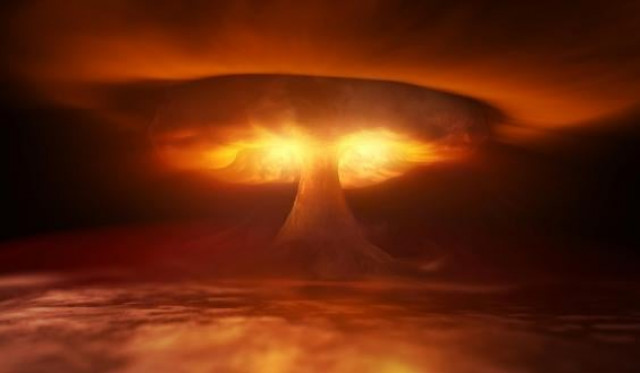Here's what the earth would be like after a nuclear war
Study assesses impact of 100 nuclear warheads dropping over India and Pakistan

PHOTO: AFP
Russian news broadcaster Dmitry Kiselyov has warned of nuclear implications that may result as a consequence of "any impudent behaviour" by Washington towards Moscow.
No plans to pursue "no-first-use" policy: Pentagon chief
His remarks came after US Secretary of State John Kerry said that Russia and Syria must be subjected to a war crimes investigation for recent attacks on Syrian civilians.
Kiselyov's remarks can be considered fairly inflammatory between the two nuclear-armed super powers. A study outlining the effects of a nuclear war show the severe impact on planet earth.
Defying UN, North Korea vows to strengthen nuclear capability
The study estimated the consequences to the planet after a limited, regional nuclear war, which assessed the impact of 100 nuclear warheads dropping over India and Pakistan -- a conflict considerably smaller than a Russo-American one.
The results of the nuclear outbreak in the study are extremely unpleasant, to say the least. Along with the hundreds of thousands of deaths, five megatons of black carbon are thrust into the atmosphere. Black carbon absorbs heat from the sun before it reaches the earth, while some of it comes back down as rain.
India, Pakistan could skid into nuclear war, top expert warns
This has an adverse effect because it causes atmospheric cooling. The effect on the temperature is profound. Earth's falling temperature would cause, among other things, less rain -- nine per cent less than usual five years after the strikes -- which would have an effect on crops, combined with increased frost.
Over time, Earth's ozone layer will be depleted by around 20 to 25 per cent in five years. More sunburns and skin cancer will occur because of this, and fewer crops will grow. This can lead to food shortages, even famine in some regions.
Therefore, it is fairly reasonable to conclude that, in light of the study, nuclear war is pretty bad and should be refrained from at all costs.
This article originally appeared on The Independent





1726734110-0/BeFunky-collage-(10)1726734110-0-208x130.webp)













COMMENTS
Comments are moderated and generally will be posted if they are on-topic and not abusive.
For more information, please see our Comments FAQ